Can I Wash My Cat with Just Water? Vet-Approved Bathing Tips
By Jordyn Alger
Updated on
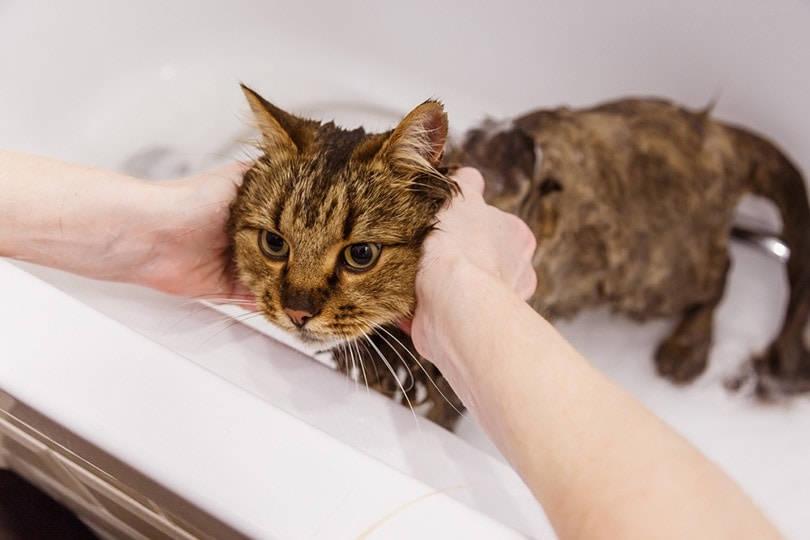
Washing a cat can be a tricky process, and it can be tempting to rinse your cat with water and hope that it is good enough. But is it? The answer is that it depends on the purpose of the bath. For most situations in which you need to give your cat a bath, you should use shampoo. Situations in which your cat may need more than just water is if you have to clean something sticky off their coat, or if your veterinarian has diagnosed your cat with a skin disease that requires a medicated shampoo. But if your cat just got a little mess on their fur and you want to rinse it off, water may be enough. However, in most cases, shampoo will be needed to clean your cat thoroughly. Keep reading below for more tips on properly bathing your cat.
When Do Cats Need to Be Bathed?
Most cats don’t generally need to be bathed on a regular basis. An exception to this would be hairless breeds, such as Sphynx cats, for which bathing is part of their care routine. Typically, cats groom themselves with their tongues, removing loose hair and debris.
Still, there are times when cats need baths. If your cat has made a mess, they may not be able to clean themselves entirely. In such an instance, you will need to bathe your cat. Some examples of when it is appropriate to bathe your cat include:
- Your cat has gotten into something difficult to remove from the fur, such as sticky syrup
- Your cat is infested with ticks or fleas and needs to be bathed in medicated shampoo
- Your cat has vomited or defecated on themselves
Some people wonder if it is safe to bathe cats at all. If you are hesitant to bathe your cat because of this, rest assured that bathing your cat now and then is safe. You simply have to know what you have to prepare and what are the steps to follow.
What Do You Need to Give Your Cat a Bath?
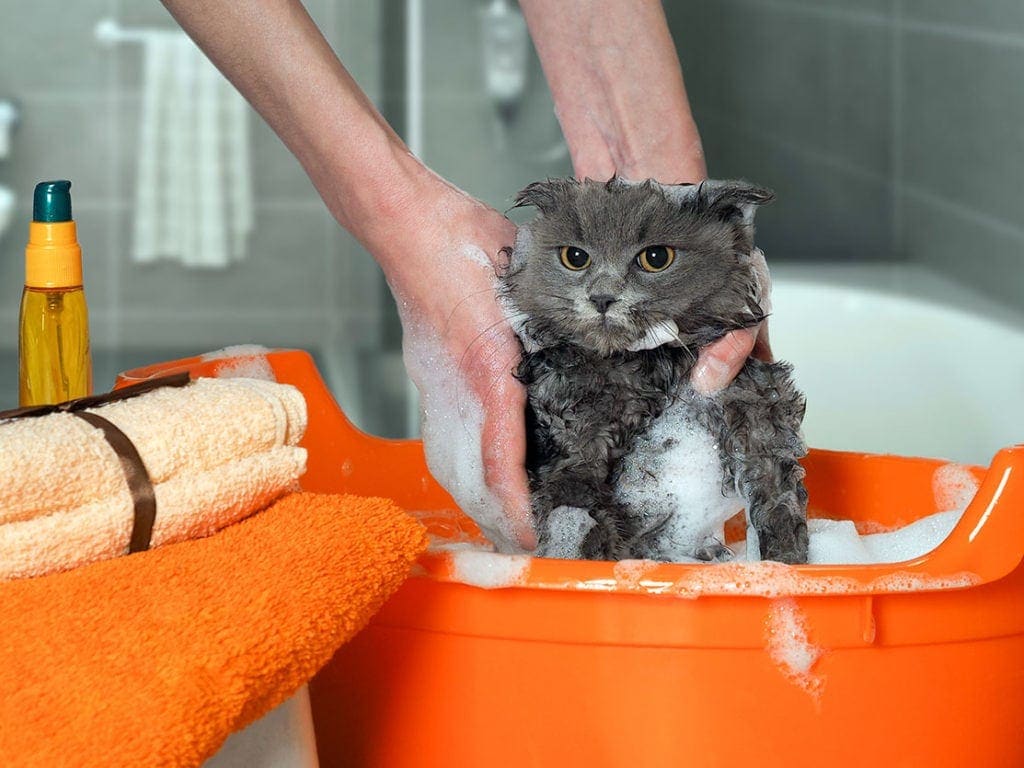
Before filling up the tub and getting your cat in the water, you will want to ensure that you have everything you need to give your cat a proper bath. There are few things worse than getting your cat wet only to realize that you don’t have what you need to bathe them.
- Feline shampoo
- A pitcher or ladle for rinsing
- Rubber gloves
- A gentle washcloth to clean your cat’s face
- Cotton balls to clean your cat’s ears
- A towel
- Treats
Whether you bathe your cat in a bathtub or a sink is up to you. Some people find the bathtub easier, as it gives you more room to work, while others find the sink easier because you don’t need to kneel.
Keeping your pet's skin and coat clean and healthy is very important, but finding a great shampoo can be harder than the actual grooming! We love our Hepper Pet Shampoos because they makes grooming so much easier. These pH-balanced formulas are made with natural ingredients like oatmeal, cucumber, and aloe. They are free of phthalates, sulfates, and soaps and very gentle on your pet's skin. Now you just need to decide which formula is best for your fur baby! Here’s a quick guide to help you choose the right option for your pet’s next bath!
 Hepper Colloidal Oatmeal Pet Shampoo |
 Hepper Waterless No Rinse Pet Shampoo |
|
|---|---|---|
| Natural cucumber & aloe scent |
Natural cucumber & aloe scent:
|
Natural cucumber & aloe scent:
|
| Safe for cats & dogs |
Safe for cats & dogs:
|
Safe for cats & dogs:
|
| Rinsing required |
Rinsing required:
|
Rinsing required:
|
| Free of harsh chemicals & nasty ingredients |
Free of harsh chemicals & nasty ingredients:
|
Free of harsh chemicals & nasty ingredients:
|
| Lathers easily |
Lathers easily:
|
Lathers easily:
|
Preparing Your Cat for a Bath
Before bathing your cat, there are a few steps you need to take in preparation.
1. Trim Your Cat’s Nails
During bath time, your cat may grow understandably upset. They may lash out and scratch you by accident, so it can help to trim their nails beforehand if you have some experience with this process. If you’ve never trimmed your cat’s nails or you know for a fact that this step will upset your cat, just skip it.
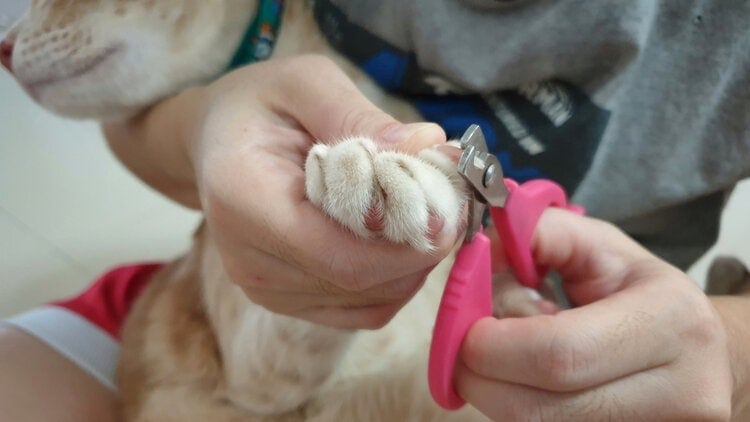
2. Don’t Forget to Brush
Brushing your cat’s fur before bathing can help remove clumps of hair to keep them from going down your drain.
3. Offer Some Traction
The bottom of a tub or sink is sleek and slippery. If your cat cannot find traction and stand on their own legs, they may panic even more, making the bathing process difficult. By placing a towel or mat at the bottom of the tub, your cat can find their footing much easier.
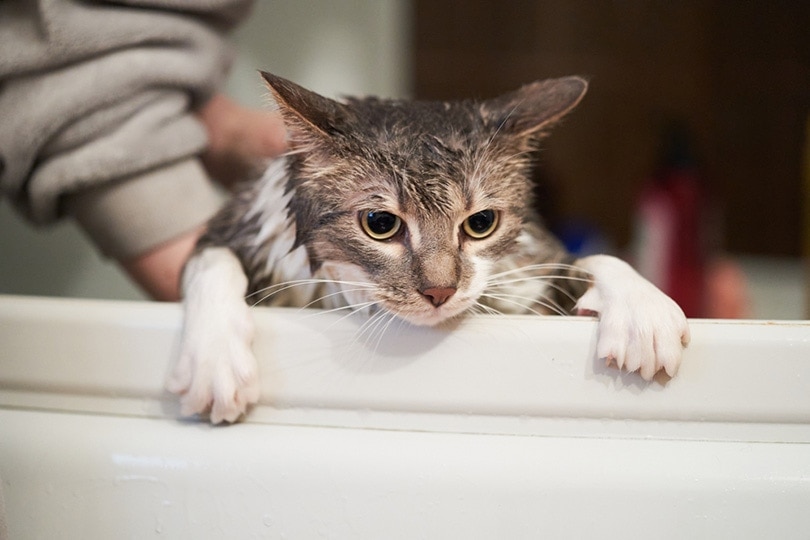
4. Find the Right Timing
If your cat is full of energy or agitated, it is probably not the right time for a bath. Try to time baths when your cat is calm.
How to Bathe Your Cat
Bathing your cat may seem tricky, but it doesn’t have to be. If you follow these steps, it can make your experience much smoother. If your cat has made a mess only in one part of their body, it is always better to bathe that particular area rather than their whole body.
1. Introduce Your Cat to Water
Bathing will be much easier if you can introduce your cat to water over several days or weeks. First, get your cat used to the tub. Give them treats while they’re in the tub because if they can create positive associations with the tub early on, the cat will be less hesitant to be in it during bath time. Later, try dipping your cat’s toes into the water, taking them out, and giving them a treat.
2. Place Your Cat in the Water
Gradually lower your cat into the water, petting them soothingly and talking in a calm voice. Do your best to keep your pet calm.
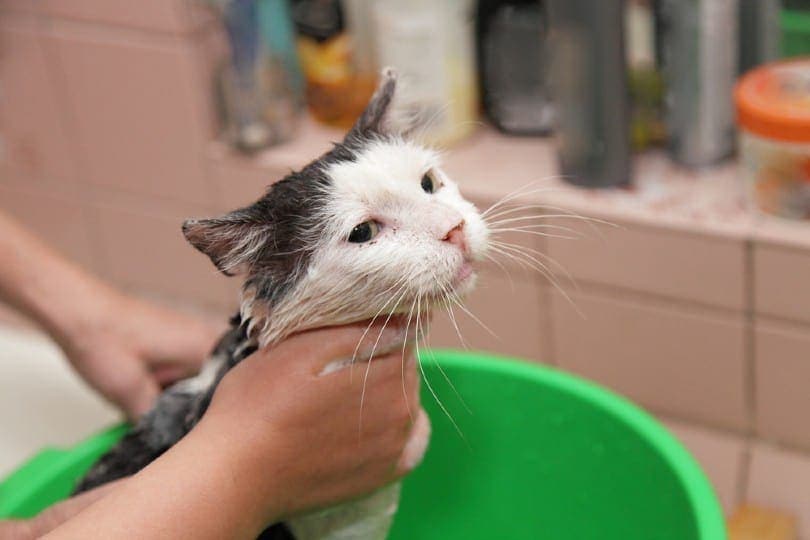
3. Wet Your Cat’s Fur
With your pitcher or ladle, gently pour water over your cat. Avoid the face, as this will startle your cat.
4. Lather in the Shampoo
Once your cat’s fur is wet, start lathering in the shampoo. Follow the instructions on the shampoo to determine how long you should keep the suds on their coat. Once you are done, rinse the shampoo away entirely.
Do not use human or canine shampoo for your cat. Cats require shampoo that is pH-balanced for them. If you use a shampoo that is not appropriate for them, it can cause serious issues for their skin.
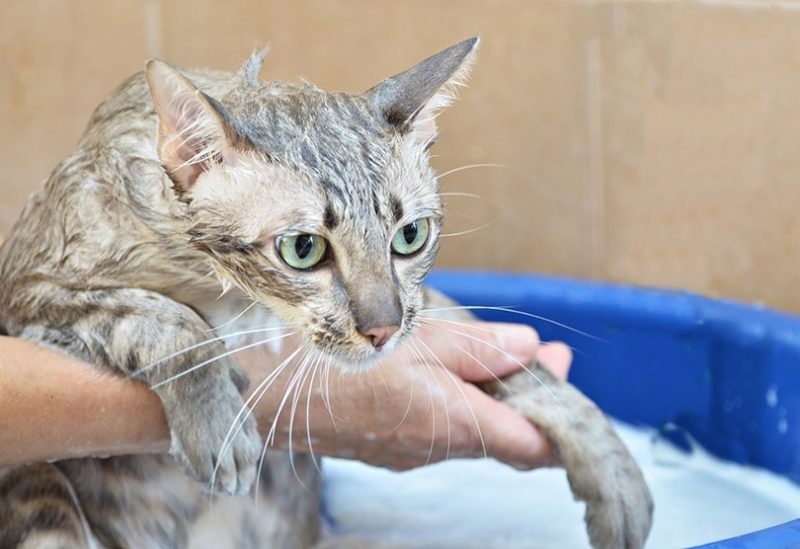
5. Clean the Face
You will want to be extra gentle here because most cats do not enjoy their faces being touched. The soft washcloth can be used to gingerly wipe your cat’s face, and the cotton balls can be used to clean the outside of its ears.
Drying Your Cat
Finally, bath time is over! Your cat may want to get out and run, but you’ll need to dry them off first. Towels are the best way to dry off cats, as most cats do not like the sound of a hairdryer. Plus, hair dryers can be too hot for cats, so if you do use one, make sure to use it on a lower, cooler setting and keep a safe distance from their skin.
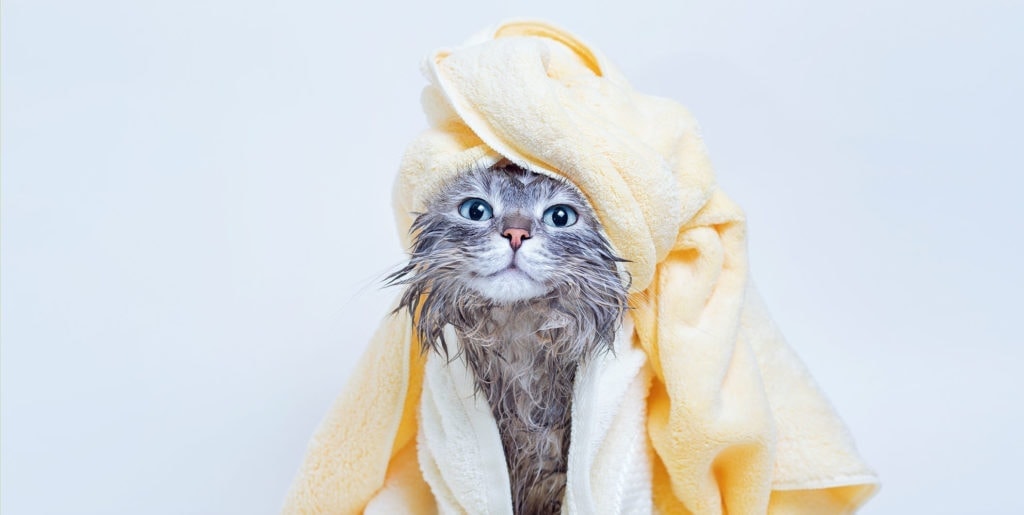
After the Bath
Once your cat is clean and dry, be sure to take time to recognize how brave they’ve been. Give them lots of treats, praise, and affection. Positively reinforcing bath time can also help to make the next bath time a less harrowing experience. If your cat trusts that there will be rewards during and after the bath, they may begin to associate bath time with the experience after rather than the scariness of the water.
Final Thoughts
Many people say that cats and water do not mix, and perhaps that is true to some extent. However, bathing your cat in water is necessary from time to time. Helping your cat grow accustomed to bath time is the best way to make the entire process smoother. Your cat may never entirely love water or bath time, but it can learn to be patient and accept the temporary discomfort if there are rewards involved at the end.
Featured Image Credit: 135pixels, Shutterstock














